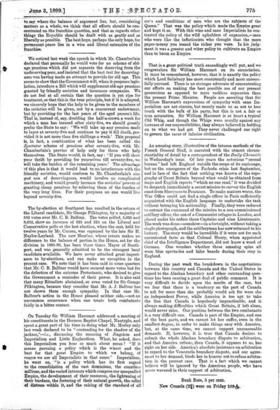On Tuesday Sir William Harcourt addressed a meeting of his
constituents in the Hermon Baptist Chapel, Nantyglo, and spent a great part of his time in doing what Mr. Morley only last week declared to be "contending for the shadow of the jackass,"—i.e., discussing the meaning of Jingoism and Imperialism and Little Englandism. What, he asked, does this Imperialism you hear so much about mean ? "If it means pursuing a policy which is the wisest and the best for that great Empire to which we belong, of course we are all Imperialists in that sense." Imperialism, he went on, "is a policy which has its first regard to the consolidation of the vast dominions, the countless millions, and the varied interests which compose our unequalled Empire, the development of their resources, the lightening of their burdens, the fostering of their natural growth, the relief of distress within it, and the raising of the standard of all sorts and conditions of men who are the subjects of the Queen." That was the policrwhich made the Empire great and kept it so. With this wise and sane Imperialism he con- trasted the policy of the wild upholders of expansion,-'-men who were like the inflationists who thought that the more paper-money you issued the richer you were. In his judg- ment it was a greater and wiser policy to cultivate an Empire than to boom an Empire.






































 Previous page
Previous page